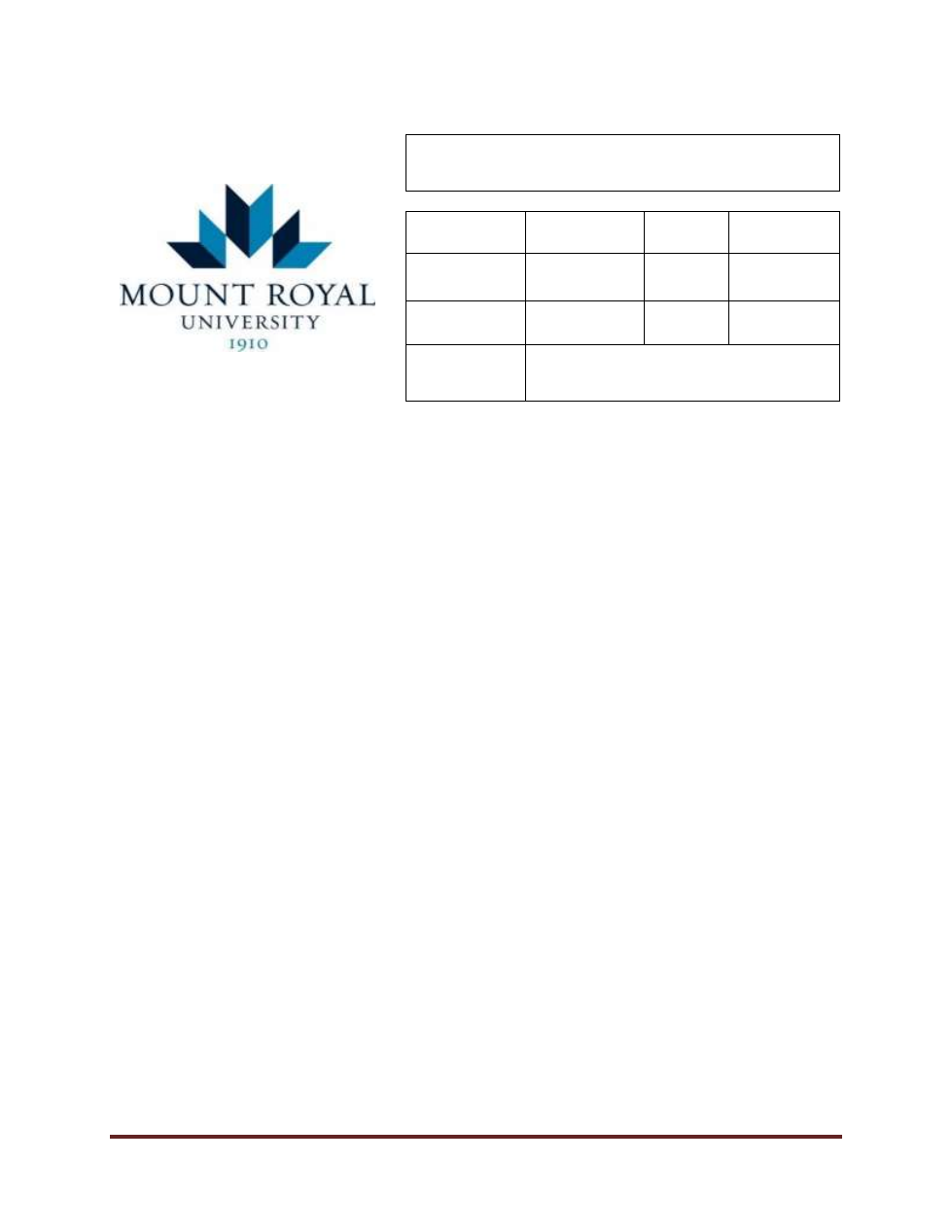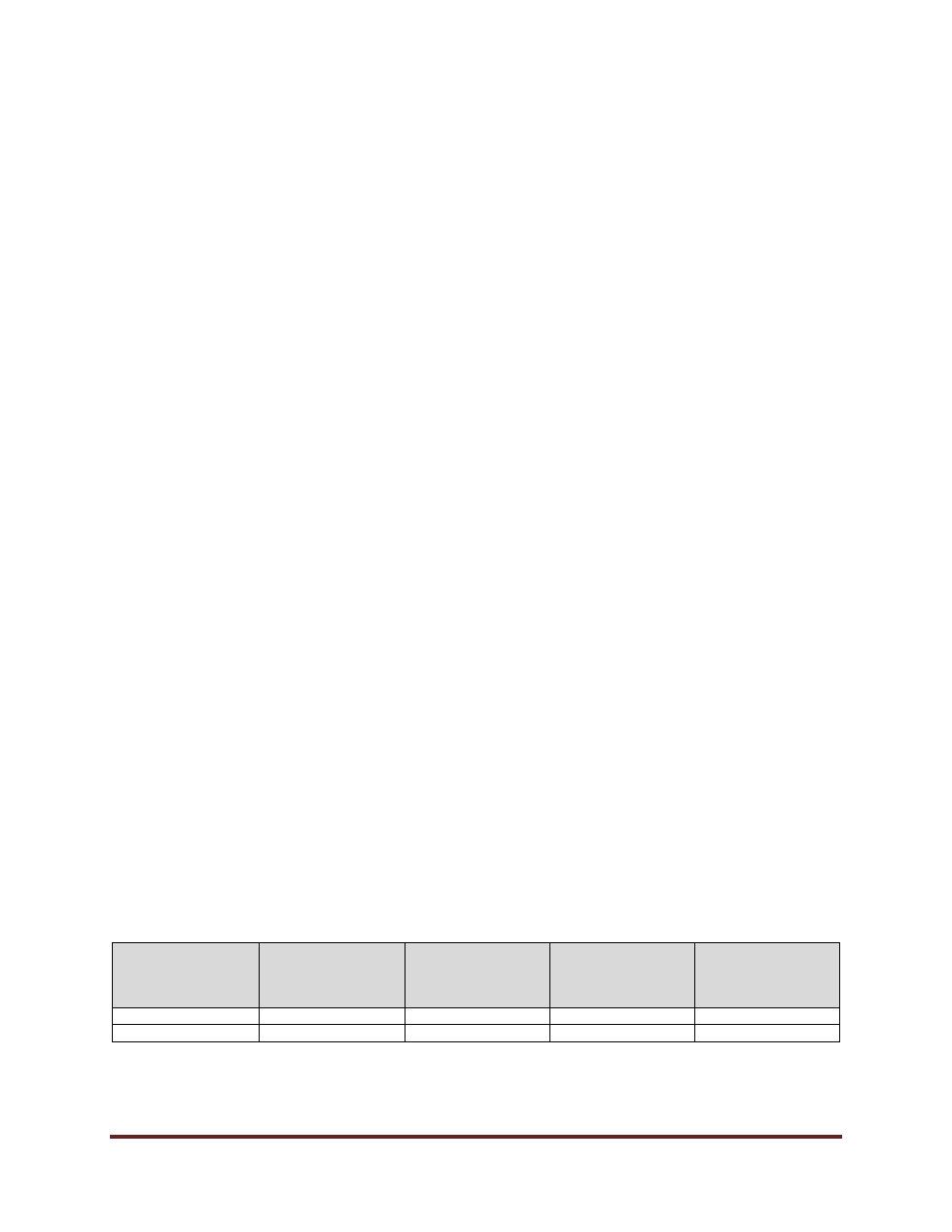
Code of Student Community Standards Policy – May 20, 2022
Page 1 of 9
THE
CODE
OF
STUDENT
COMMUNITY
STANDARDS
Policy Type:
Academic
Initially
Approved:
May 20, 2022
Policy Sponsor:
Vice-President,
Students
Last
Revised:
Primary Contact:
AVP Student
Experience and
Success
Review
Scheduled:
May 20, 2027
Approver:
General Faculties Council
A.
OVERVIEW
The University is committed to fostering a safe, inclusive and supportive learning, working and living
environment. All members share responsibility for maintaining a community of mutual respect and
civility. The General Faculties Council Student Affairs Committee is responsible for the oversight of
this policy and associated procedures.
The University values the rights and responsibilities of our community members provided by law or
regulation. This policy reinforces these rights and sets out the University’s expectation that students
act with a high level of responsibility in order to preserve a safe, respectful and inclusive community.
By enrolling, students accept and acknowledge their rights and responsibilities within this policy
document
.
B.
PURPOSE
The Code of Student Community Standards (Code) is intended to outline and communicate the
standards of respectful and responsible non-academic student behaviour and outline a process to
resolve harmful behaviours using a fair and education focused process.
Community members are encouraged to reach agreement with each other using
informal/alternative resolution pathways, when possible. The University will strive to honour the
ways in which our diverse population address and resolve harmful behaviours and will collaborate
in doing so.
C.
SCOPE
The Code applies to non-academic behaviours of a Student, whether in-person, virtual, or online
and occurs;
● on University premises; or
● involves University related property or activity such as but not limited to, classes, events,
field schools, practicum placements, research, exchanges, conferences, or Student
Association activities;

Code of Student Community Standards Policy – May 20, 2022
Page 2 of 9
● occurs off campus whereby the behaviour has substantial connection to, or adverse
impact on, University operations or a member of the University’s ability to reasonably
participate in University related programs, activities, or employment.
To maintain a safe community and a fair process, the University may in certain cases be required
to take action such as: report to law enforcement agencies, use Interim Measures, assign a third-
party Investigator, and/or delay an internal investigation. The outcome of any criminal or civil
proceeding does not inform the application of the Code.
D.
POLICY STATEMENT
The Code relates to the behaviours of Students within University related activities and seeks to
ensure the personal safety and wellbeing of all members of the University Community. The goal is
to create a supportive learning environment, prevent disruptive or harmful behaviours, protect the
safety and reputation of the University and individual community members, and to respond to
situations that adversely impact the above.
1. RIGHTS AND RESPONSIBILITIES
1.1.
Members of the University Community have the right and responsibility to;
a. familiarize and uphold the core values of the institution and conduct
themselves in a manner that represents these shared community values;
b. engage in respectful civil discourse and to express their opinions and beliefs
as outlined within the Expression and Free Speech Policy;
c. have this Code adhered to and to make a complaint under this Code without
fear of reprisal or retaliation;
d. be provided reasonable accommodation to the Code process, as determined
by the University’s Human Rights Policy;
e. protect the privacy of personal information consistent with existing legislation
and policy;
f. confidentially consult with representatives of the Office of Student Community
Standards (OSCS) regarding the Code, investigation process, resolutions, and
available services and supports;
g. seek assistance from a University Official and/or medical professional for
themselves or for community members who are in distress without necessarily
being subject to discipline;
h. meet with a representative of the institution, free of judgement, to access
guidance and support regarding the Code process. The University will strive
to respond with a Trauma-Informed Practice to Reports and in a timely manner
that encourages the development of all Students, while protecting and acting
in the best interests of the University Community.
1.2.
Students have the right and responsibility to;
a. familiarize themselves with the Code and conduct themselves in a manner that
is consistent with the Code;
b. a fair process that maintains the principles of procedural fairness, including; a
process free from bias, the ability to respond to the allegation(s), the reason(s)
for a decision, and the right to appeal a decision;
c. seek guidance and support from trusted sources such as a Student
Association Advocate, University Officials, Elders, or personal supports;

Code of Student Community Standards Policy – May 20, 2022
Page 3 of 9
d. have a Support Person present at any stage of the process;
e. make inquiries, register a complaint, or seek support through other internal or
external administrative processes.
2. NON-ACADEMIC MISCONDUCT AND HARMFUL BEHAVIOURS
2.1.
Non-academic Misconduct is behaviours, whether actual, attempted, or assistance
provided to another, that are reasonably understood to have an adverse effect on
the integrity and proper functioning of the University; or the health, safety, or the
rights of the members of the University Community. Ignorance, anger or
substance use will not be accepted as a reasonable rationale for engaging in
harmful behaviour.
2.2.
The following is a non-exhaustive list of behaviours considered to be Non-
academic Misconduct.
a. Harm to Community Members; by word or by action behaviour that can
reasonably be understood to cause others to be fearful, injured, or have
concern for their wellbeing or dignity and/or that impedes others from
participating in University activities or practices such as:
i.
Impacting others with unwelcome or persistent conduct, whether
written or electronic, that would be reasonably known to be
unwelcome, cause harm, intimidation, bullying, coercion, or retaliation;
ii.
Impacting others from engaging in activities or performing University
duties such as disrupting a learning environment or activity;
iii.
Failing to reasonably prevent or intervene when witness to a harmful
act;
iv.
Obtaining, using, or distributing information or media of others, in any
format, without consent that would knowingly cause harm, distress or
breach of an individual(s)’s reasonable expectation of privacy;
v.
Harming, injuring, threatening to harm, or creating a dangerous
environment impacting the health and safety of others;
vi.
Limiting a person’s right to express their opinions and beliefs in a
respectful and civil manner;
vii.
Participating in acts of hazing or initiation whether consensual or not.
b. Misconduct Involving Property; behaviour that involves the misuse,
destruction, alteration, or damage of University property, resources,
technology and information technology platforms such as;
i.
Accessing, entering, or use of an unauthorized/restricted area or
equipment;
ii.
Damaging, defacing, destroying, altering, or removing University
property;
iii.
Taking property or use of, and/or possession of property or material
known to be stolen or taken from another without consent;
iv.
Accessing, installing or using malicious processes or software
programs to gain information, interrupt services, or disrupt information
technology accounts, platforms or resources;
v.
Interfering, obstructing, or tampering with any life saving equipment or
emergency procedures.

Code of Student Community Standards Policy – May 20, 2022
Page 4 of 9
c. Misrepresentation or Misuse of Information; behaviour that involves the
misrepresentation of a person, process, or service such as;
i.
Misrepresenting yourself or others within an institutional process or
activity;
ii.
Fabricating, duplicating, or submitting false, incomplete, misleading,
or altered identification and/or information in an attempt to gain an
advantage;
iii.
Failing to comply with the directions or provide identifying information
when asked by a University Official operating within the scope of their
role.
d. Regulated and Illegal Substance use; behaviour that does not comply with
the laws or institutional expectations involving controlled substances such as
alcohol and cannabis, and/or illegal substances such as;
i.
Failing to comply with the provincial regulations around the use,
possession, and consumption of alcohol, tobacco, or cannabis;
ii.
Being impaired by a regulated substance in a manner that creates
disruption, risk, or harm to self or others;
iii.
Failing to adhere with provincial regulations around the use,
possession, and/or distribution of illegal substances including
narcotics or prescribed drugs not prescribed to the person in
possession of these drugs.
e. Breach of safety standards; behaviours that are willfully unsafe in or out of
an academic setting (i.e. shop, laboratory, worksite) that contravenes
applicable safety procedures or institutional or provincial health and safety
requirements.
f. Weapons, explosives; the possession, use, or storing of items such as
firearms, weapons, explosives, or chemicals including swords, ammunition,
fireworks, replica weapons, knives, or wielding an object in a threatening
manner.
g. Violation of University Policies; behaviour that violates any University
policy, rule, or regulation including but not limited to:
i.
Human Rights Policy;
ii.
Sexual Violence Response Policy;
iii.
Smoking Policy;
iv.
Workplace Violence and Harassment Prevention Policy
h. Misuse of Policies or Processes; behaviours, including facilitating or
encouraging others to, interfere with the administration of University policies,
procedures, or rules such as:
i.
Falsifying, distorting or misrepresenting information involved within a
process;
ii.
Disrupting or impacting the proper participation of administrative
processes;
iii.
Failure to comply with directions, decisions, or outcomes associated
with University policies;
iv.
Making, or conspiring to make, vexatious, frivolous, or malicious
complaints under University policies or processes.

Code of Student Community Standards Policy – May 20, 2022
Page 5 of 9
i. Contravention of other Laws; behaviours that contravene federal,
provincial, or municipal statute, bylaw, regulation, or other laws such as
participating in activities associated with gambling or failing to comply with law
enforcement officers.
3. REPORTING
3.1.
When someone is aware of a situation involving suspected violations of the Code
should be reported to the Office of Student Community Standards (OSCS) as soon
as possible following the occurrence of the behaviours. Any incidents involving
imminent risk or harm are to be reported immediately to Security Services. The
OSCS is responsible for reviewing and determining the appropriate process as
outlined within the Code of Student Community Standards Procedures and other
University policies. To minimize the risk of harm, Security Services or designate
may serve as a Complainant for Reports that involve immediate or ongoing risk to
the University or an individual.
3.2.
The University recognizes that the health and wellbeing of all University
Community members is paramount to the realization of the University’s mission
and mandate and that some Student behaviours require response with relevant
health and wellness measures. The multi-disciplinary Student Support and
Response Team (SSRT) (Student Support and Response Team Procedures) is
responsible for reviewing, assessing, and responding in a non-disciplinary manner
to support the health and wellbeing of Students and those impacted by the
situation. The team will determine appropriate ways to support the Student’s
learning, provide access to health and wellbeing services and address any
potential risk or harms to the Student, University Community, or others.
3.3.
Reports made through the Code may be referred to the SSRT if deemed
appropriate. A Report being reviewed by the SSRT does not preclude any actions
being taken by the Code.
4. MULTIPLE PROCEEDINGS
4.1.
Students may have multiple relationships with the University, (such as student
employee, athlete, resident, or work practicum) and/or their actions may intersect
more than one University policy, or external law or regulation. In such instances,
those responsible for the respective policies or regulations will jointly determine
the application of applicable policies and the appropriate process to be applied and
in what order.
5. INTERIM MEASURES
5.1.
Any Report that includes an immediate, ongoing, or possible risk to others or the
University will be reviewed by OSCS and Security Services to determine if and
what Interim Measures are necessary. Interim measures are taken to protect the
safety and/or wellbeing of the University Community, including the Respondent.
Such measures are preliminary in nature, non-disciplinary, and do not imply the
individual(s) has violated the Code. Any Interim Measure applied will be reviewed
every seven (7) days and renewed if necessary pending the decision from the
Code investigation. Interim Measures may include, but are not limited to:
a. a requirement not to contact specific person(s);

Code of Student Community Standards Policy – May 20, 2022
Page 6 of 9
b. limited access to spaces, programs, software, or services;
c. a requirement to communicate with a University Official;
d. temporary removal from University properties or activities.
5.2.
Failure to comply with an Interim Measure constitutes a violation of the Code.
6. RESPONDING TO REPORTS OF NON-ACADEMIC MISCONDUCT OR HARMFUL
BEHAVIOURS
6.1.
After submitting a Report, a representative from the OSCS will be assigned to
review the information, determine if the Code applies, identify a Complainant,
assess their willingness to participate in a process, and decide how to engage the
Code of Student Community Standards Procedures.
7. INVESTIGATIONS
7.1.
If the OSCS determines that the Code applies to the Report, they will assign an
appropriately trained Investigator. The Respondent will be notified of the
investigation and provided an opportunity to respond. The investigation process
includes but is not limited to the interviewing of Witnesses or individuals with
relevant knowledge, the gathering and reviewing of materials and documents, and
consulting appropriate policies or procedures. The findings of the investigation will
be summarized in an Investigation Findings Report and used in determining a
finding of responsibility and, if warranted, the appropriate resolution(s).
7.2.
All Students engaged in the process can include a Support Person at all stages
and are encouraged to seek guidance and support from trusted sources such as
a Student Association Advocate, University Officials, Elders, or personal support.
8. DECISION MAKER AND RESOLUTIONS
8.1.
Once the investigation is complete, the assigned Decision Maker will determine
whether a violation of this Code occurred.
8.2.
When the Respondent takes responsibility for their behaviour(s) and/or where
there was limited harm caused by the behaviours, may be resolved by an OSCS
representative or designate who will serve as the Decision Maker. The OSCS will
work with the Respondent to assign appropriate resolutions below in a manner that
amends the harm caused to the Complainant and/or the University Community.
Misconduct resolved in this manner may assign one or more of the following
resolutions:
a. Warning; a written notice outlining a breach and the need for behaviour to
change;
b. Apology; a written or video message acknowledging responsibility and
outlining corrective action;
c. Agreement; a mutually agreeable, written, resolution, signed by all relevant
parties, outlining an action plan with set parameters and resources to support
continued participation in the University Community;
d. Restitution; compensation, monetary or material replacement, for damage to
property;

Code of Student Community Standards Policy – May 20, 2022
Page 7 of 9
e. Educational Action; participation in an opportunity to enhance learning such
as a workshop, training, community service, reflective exercise, project, or
other form of learning;
f. Assessment of Employment; a recommendation to the Human Resources
Department to review a student employee’s contract based on the intersection
and impact of behaviour with the nature of the student’s employment;
g. Restorative Actions; mutually agreeable resolution process for the
Complainant, Respondent, and others;
h. Referral; the recommendation to attend, participate, or complete a service or
training;
i. Restricted Access; a restriction limiting an individual’s access to an area,
service or experience associated with the University other than scheduled
academic activities;
j. Loss of Privileges; loss of eligibility to attend, participate, or membership to
a club, team, organization, or activity for an expressed period of time, including
relocation or eviction from student housing;
k. No Contact Order; a requirement to have no contact with an individual(s),
whether direct or indirect, either virtual or in person for a specified time period.
8.3.
If a Student has been found to be responsible for a violation of this Code that had
a significant impact or repeated harm to the University Community or the
Investigator is unable to resolve the behaviour, the Executive Director of Student
Affairs will serve as the Decision Maker may resolve the Report with the
implementation of one or more of the above resolutions and/or one or more of the
following resolutions:
8.4.
Cases whereby the Investigator is unable to resolve the incident and/or where the
behaviours caused significant or repeated harm to the University Community, the
Executive Director of Student Affairs or designate will serve as the Decision Maker
and may resolve the Misconduct by assign one of more of the above resolutions
and/or one or more of the following resolutions;
a. Course(s) Deregistration; being withdrawn from a single or multiple courses
at the University which may include a partial or total loss of fees and/or grade;
b. Program Deregistration; being withdrawn from a University program which
may include a partial or total loss of fees and/or grades;
c. Removal of a University Appointment; loss of eligibility to have or continue
to have University appointments such as employment, varsity status, or an
internal University based award, scholarship, or bursary;
d. Suspension; a temporary prohibition of enrollment, of up to three (3) years,
which may include a loss of student privileges. Suspensions may result in a
notation on a student’s transcripts for the duration of the suspension.
Suspensions may include a partial or total loss of fees and funds and
associated grades and may include conditions associated with the return to
the University;
e. Expulsion; a permanent prohibition of enrollment which includes a complete
loss of student privileges. Expulsions may result in a notation on a student’s
transcripts for up to five (5) years. After the required time has elapsed, an
expelled student may apply to the Student Appeal Committee for the removal
of the notation on the transcript.

Code of Student Community Standards Policy – May 20, 2022
Page 8 of 9
9. APPEALS
9.1.
A Student who has been found responsible for a breach of the Code may request
an appeal of the decision to the Student Appeal Committee as outlined in the
Student Appeal Policy and Procedures.
10. RECORDS AND REPORTING
10.1.
All documents and records collected as a result of these policies and procedures
will be maintained in compliance with the University’s Records Policy and the
Alberta Freedom of Information and Protection of Privacy Act. The OSCS is
responsible for maintaining all records separate from a student’s academic record.
The OSCS will prepare an annual statistical report of all misconduct addressed
according to the Code for the General Faculties Council – Student Affairs
Committee. This report shall be anonymized and ensure no identifying information
is included.
E.
DEFINITIONS
(1)
Code:
means the Code of Student Community Standards.
(2)
Complainant:
means the person or harmed party, who brings forward
information that a violation of a policy may have occurred.
(3)
Decision Maker:
means the person responsible for determining whether or not a
violation of a policy has occurred and assigns a resolution.
(4)
Investigator:
means the individual, either internal or external to the
University, responsible for collecting the facts of a Report.
(5)
Investigation Findings
Report:
a document prepared by the Investigator that outlines details
regarding the investigation of a Report including the details of
the investigation, statement of facts, and finding.
(6)
Report:
a statement to the University seeking recourse pursuant to the
violation of this policy.
(7)
Respondent:
means the individual alleged to have caused harm and violated
this policy.
(8)
Student:
means someone who has applied to a full-time, part-time, credit
or non-credit program or course offered through the University.
(9)
Support Person:
an individual, unrelated to the Report/incident, who can attend
meetings with a Respondent or Complainant throughout the
course of an investigation or appeal to provide personal
support but may not speak on their behalf.
(10)
Trauma-Informed
Practice:
means an approach for engaging with Individuals that involves
understanding and recognizing the presence of trauma
symptoms and the impact of trauma on the individual.
(11)
University:
means Mount Royal University.

Code of Student Community Standards Policy – May 20, 2022
Page 9 of 9
(12)
University Community:
includes Students, Employees, the Board of Governors,
Contractors, Volunteers and Visitors to the University.
(13)
University Official:
a person acting in the capacity as outlined by their employment
at the University.
(14)
Witness(es):
means an individual who was present, either immediately
before, during, or after an incident who may have information
regarding the Report/incident.
F.
RELATED POLICIES
● Academic Accommodation for Students Experiencing Disabilities Policy
● Acceptable Use of Computing and Communication Resources Policy
● Code of Conduct – Employees Policy
● Expression and Free Speech Policy
●
Human Rights Policy
● Sexual Violence Response Policy
● Smoking Policy
●
Student Appeal Policy
● Universal Access Policy
● Workplace Violence and Harassment Prevention Policy
G.
RELATED LEGISLATION
● Alberta Freedom of Information and Protection of Privacy Act
● Alberta Health Information Act
● Alberta Human Rights Act
● Alberta Occupational Health and Safety Act
● Alberta Post Secondary Learning Act
● Canadian Charter of Rights and Freedoms
● Gaming, Liquor and Cannabis Act of Alberta
H.
RELATED DOCUMENTS
● Report Form
I.
REVISION HISTORY
Date
(mm/dd/yyyy)
Description of
Change
Sections
Person who
Entered Revision
(Position Title)
Person who
Authorized
Revision
(Position Title)








